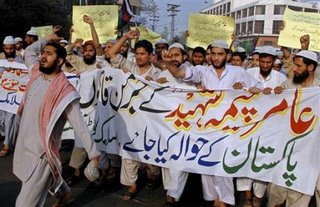
Panel – Sociology of Islam and Muslims Societies
The 2008 Annual Meeting of the Southern Sociological Society
http://www.southernsociologicalsociety.org/
April 9-12, 2008, Richmond, Virginia - USA
Invitation for Panel Papers
Dear all,
At the Southern Sociological Society annual meeting last year there were five panels with 20 presentations on Islam, the Sociology of Islam, and Islamist Movements. This coming year, the annual meeting will take place on April 9-12, 2008 in Richmond, Virginia and we will be organizing panels on Sociology of Islam and Muslim Societies.
Islam and Muslim societies are being increasingly studied by sociologists, particularly by those interested in how different Islamic groups are responding to globalization. In the current political, social and economic conflict between the West and Muslim Societies, Islam has entered the political arena as a manifestation of Muslims against Western-based capitalism and hegemony. In this context, religion has transformed from a belief system to an ideology of political resistance in both the mind and within the actions of Muslims. From Turkey to Indonesia, this conflict may be creating the unified Muslim identity—the Muslim Ummah— Islamist and social thinkers such as Sayyid Qutb and Abul A’la Mawdudi were promoting nearly a half a century ago. From the Danish and Swedish cartoon crisis to Islamophia, Muslims appear to be crafting a collective identity that transcends the old categories of tribe, community and nation-state. This ‘new’ identity now exists beyond the nation-state, both in the West and in Muslim-populated countries, and is reshaping the understanding of globalization by Muslims.
We are organizing two panels entitled, "Sociology of Islam and Muslims Societies," and welcome submissions related to but not limited to the following subjects:
• Islam, Modernity and Secularism
• Islamist Movements and Collective identity,
• Islam and Muslims in Europe and US
• The Middle Eastern Politics
The deadline for abstract paper submissions is: DECEMBER 12, 2007
Please send abstract to: sociologyofislam@vt.edu
Tugrul Keskin
tugrulk@vt.edu
Virginia Polytechnic Institute and State University
Stephen Poulson
poulsosc@jmu.edu
James Madison University
Kemal Silay
ksilay@indiana.edu
Indiana University







